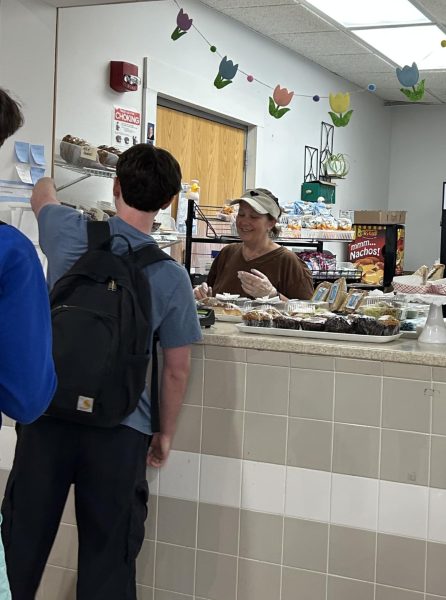Global climate change and its everlasting effects
Whether you’re an avid skier who craves the first sight of glistening snowflakes falling towards the ground, or someone who’d prefer to isolate themselves from the barren cold winter months, if you live in Upstate New York, there’s no denying that from November to March, the region is historically characterized by icy roads, below-freezing temperatures, and heavy snowfall. However, for many, the last decade has provided a plethora of puzzling weather patterns throughout the winter months, leaving the general public confused and concerned about the everchanging winters of Upstate New York, regardless of their emotional status on winter as a season.
These fluctuating winters, distinguished by fewer overall inches of snow, but also more severe snowstorms and blizzard, warmer Decembers, but also unusually cold temperatures in the following months, and much later onsets of snow, provide a challenge for residents of the area to adjust to different winter conditions than natives to the area are used to. The primary cause of this increasing fluctuation? Global climate change.
For many, the consequences of global climate change are recognized exclusively in the summer months. More severe and frequent hurricanes, tornadoes, and thunderstorms coupled with extreme temperatures accentuate the horrifying nature of climate change, and the urgency of the problem. However, with the worsening state of our climate, the effects of global warming can be felt far and wide in the winter months as well. Warm spells all the way through late December caused temperatures upwards of 65 degrees fahrenheit in Central New York last year, a heat formerly unknown to Upstate New York during the month of December. Global temperatures have generally been on the rise for decades due to increased pollution from greenhouse gasses as a result of industrialization, and the dangerous effects are now becoming more prevalent worldwide.
The real danger, however, lies in the reaction of the general public to these consequences of global warming. Many have praised the higher temperatures, and reacted with joy that it was warm enough to wear a tee shirt in December, despite it being winter in Central New York. However, what many don’t realize is the adverse impacts these rising temperatures will continue to have on our climate. It is extremely dangerous for a region known for heavy snow and freezing temperatures throughout the winter months to be experiencing temperatures above 60 degrees fahrenheit in December, regardless of how enjoyable the warmer weather may be upon initial inspection. Studies suggest that the warming climate will only continue to get worse without major change to policy regarding pollution rates of greenhouse gasses, which will ultimately have extreme negative impacts on nature’s ecosystems, and the humans that rely on them.
Furthermore, the effects of global climate change are increasingly emphasized with the drastic contrast in the weather of late December to that of this year’s January. Just four weeks out from the sub-70 degree temperatures of mid-December, Upstate New York has experienced an extreme and prolonged drop in temperatures, as low as negative 5 degrees fahrenheit, with these sub-zero temperatures maintained for longer than a week. This quick turnaround is dangerous, as it shows the manipulative nature of climate change, and its ruthless ability to vary temperatures greatly in a short period of time. A negative consequence of global warming is the shift in timing of biological events. This is portrayed very clearly by this rapid decrease in temperature, as just weeks out from a previously unusual ‘green Christmas’ in Upstate New York, residents of the area are waking up to cars with doors that are frozen shut, and roads that are glazed by layers of ice due to the extreme, negative, temperatures.
Outside of Upstate New York, the effects of changing winters due to climate change are being felt just as profoundly. In the forests of California, the lack of snowfall has caused a variety of issues. Daniel Swain, a climate scientist at the University of California, Los Angeles is studying how the extremity of natural events are changing on a warming earth and says, “There was wildfire risk up until (mid-December), even at 8,000-9,000 feet in elevation. That has directly to do with the lack of snowpack.” In Texas, evidence suggests that the arctic freeze last winter that led to hundreds of deaths and devastated billions of dollars of infrastructure and housing was linked to global climate change. Research is demonstrating that overall, climate change is changing what the world knows as winter, for the worse. These negative impacts of climate change not only on winters, but as a whole, are felt far and wide, and will continue to negatively impact numerous communities until drastic changes are made to reduce the source: greenhouse gas emissions.
At the end of the day, we can all agree upon one thing; winters across the world are changing. In Upstate New York, the initial effects of this change are misleading. The warming temperatures are seemingly a positive for many, however, when one looks at the root of this change (global climate change), and the effects that will follow with drastic drops in temperature, such as severe storms, as well as the negative impacts this will have on ecosystems, the problem becomes more prevalent. Global warming is causing extreme negative effects worldwide, these effects are being seen even here– in Upstate New York winters. As the state of our climate continues to worsen, one can only wonder: how much longer can our environment sustain these worsening conditions? These peculiar winter patterns are Mother Nature’s cry for help. Ultimately, urgent change through government and business policy is necessary to reduce greenhouse gas emissions, and ensure the longevity of our Earth, and the hopeful return of normal New York winters.
Scott Hills is in his third year on The Buzz staff at FM High School. He began writing for The Buzz sophomore year, after taking the journalism...






